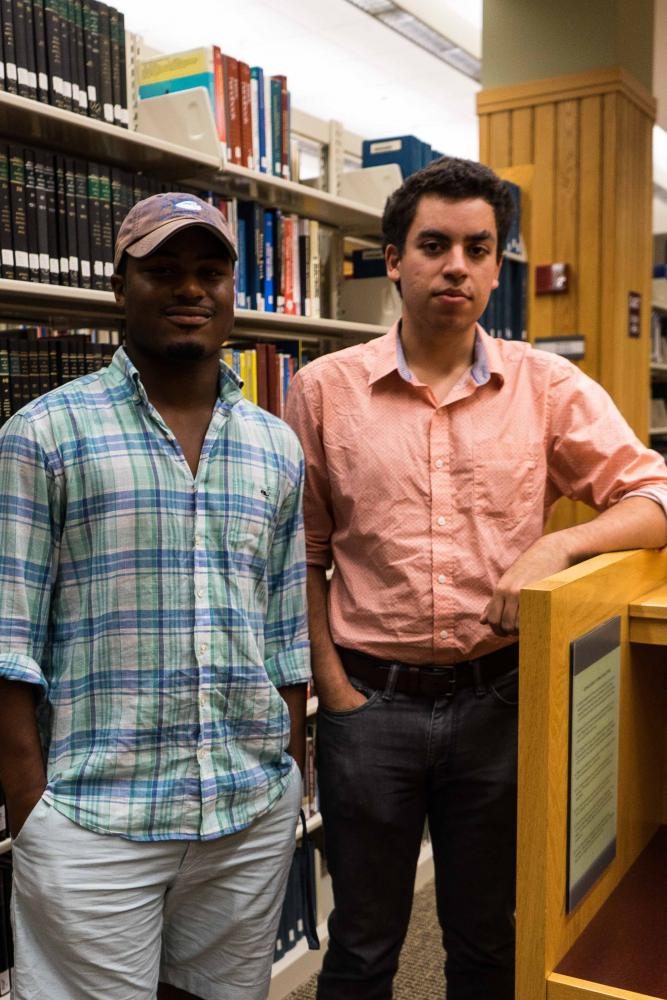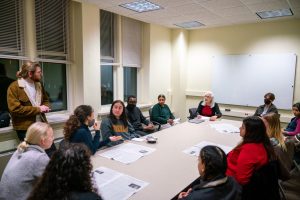Melvin Briggs, León Pescador, New Student Senators
Photo by Bryan Rubin, Photo Editor
Melvin Briggs and León Pescador.
September 15, 2017
León Pescador and Melvin Briggs were recently elected as student senators, winning in a pool of 23 candidates. They are entering Senate as the Board of Trustees is considering incorporating a student trustee, the College faces a financial crisis, and a new president takes over.
Briggs is a sophomore from Holly Springs, NC. He will serve as the Treasurer and Chartering Liaison this academic year. He decided to run for Student Senate after recognizing a clear divide between athletes and non-athletes at Oberlin. A running back on the football team, Briggs hopes to serve as a mediator to bring people together and erase the “North-South divide.” He wants to assure that everyone feels included, while bringing the College and local community together.
Pescador, a senior, said he is motivated by the strategic planning regarding financial accessibility and updates made to Oberlin Student Cooperative Association, which is a student-run, non-profit corporation that provides inexpensive, healthy, and environmentally-wise foods to a quarter of the student body. He also finds minority enrollment a concern and wants to ensure that resources for students of color on campus are maintained and that Oberlin’s commitment to social justice is upheld.
This interview has been edited for length and clarity.
Can you tell me about yourselves?
Melvin Briggs: My name is Melvin Briggs II, and I use he/him/his. I’m a sophomore Psychology major, with a planned minor in Philosophy and a concentration in Cognitive Science. I’m from Holly Springs, NC. I’m the son of a mother from Costa Rica and a father from North Carolina. As fate would have it, my mother — whose name is Melvania — would eventually meet my father Melvin. Don’t ask me how that happened. I also have a little brother named Christian who’s 12 now. I know it’s a bit of a difference than Melvania, Melvin, and Melvin, but we had enough “Mels” in the house. I went to a small private preparatory high school called St. David’s School. I’m currently a running back on the football team, but outside of athletics I’m an avid fisher.
León Pescador: My name is León Pescador. I’m a College fourth year. I use he/him/his, and I’m a Politics and East Asian Studies major. I’m from Ann Arbor, MI. I play club soccer and make different kinds of pasta. I’m really interested in policy making, which makes Student Senate a good fit.
How are you feeling about being elected to Senate?
MB: First and foremost, I’m extremely honored to have been elected by my peers to serve on Senate this year. I’m excited to represent such passionate and intelligent individuals and advocate for their needs and desires to continue making Oberlin College a pleasurable experience.
LP: I’m excited by the record turnout this election had and the results have made me more optimistic that accomplishing progress with the administration will be achievable.
What are your goals for the year? What issues are you passionate about?
MB: I’m very passionate about several things. First, I truly wish to advocate on behalf of the voice for the students of this campus. I believe that despite the small student population, there are many unheard voices that deserve acknowledgement past simple peer-to-peer interactions. I hope to increase transparency between the College and its students. Secondly, and equally as important, I hope to break down the tangible borders between student-athletes and the rest of student population. Though I am only a sophomore, I have quickly noticed a clear divide of athletes and students, and honestly, it’s kind of painful to see. Coming from a background where the only difference between an athlete [and non-athlete] was nothing more than practice and games, it was quite a culture change. Now I see separation not only in social settings but also in academic settings, where classes sometimes are either athlete-dominated or one or two athletes, if any, in a class of non-athletes. I hope to help aid in encouraging athletes to branch out and take classes without another athlete or encourage non-athletes to not be hesitant to take classes that are historically athlete-dominated or even seemed centered around athletics — [like] the English class, Thirteen Ways of Looking at Sports. Especially socially, I want to see more athletes and non-athletes integrate more and enjoy being Obies and everything that comes with that experience. Oberlin College is worldwide known for inclusion after all.
LP: I’m committed to making significant change on issues of financial accessibility, strategic planning, and minority enrollment. I’d like to work with the President and certain deans to ensure Oberlin’s financial accessibility isn’t further imperiled, hopefully reversing the OSCA-related changes from last year, as well as working with the Office of Financial Aid and Dean of Admissions to increase admissions for students of color. I’m passionate about the Strategic Plan announcements regarding cuts to OSCA’s financial accessibility, [which] galvanized me to run. I’ve been a co-op member since my second year, and OSCA’s central draw is its affordability. By reducing aid for students’ dining as well as living in OSCA, Oberlin has eroded one of its strongest, student-run institutions and damaged an amazing, talented community. To me, last year’s decisions were unacceptable.
What experience do you have in student government or other leadership positions?
MB: I personally do not have any experience in student government, but I do have a team of other well-experienced Senate members that are behind me on my passions and what I want to accomplish this year. This past summer I had the pleasure of working with Grassroots Campaigns, which an Oberlin alumnus is the Vice President of and served as a lead field manager and staff development and logistical manager. LP: Unless you count being a head cook, Student Senate is my first experience with meaningful leadership at the college level.


























